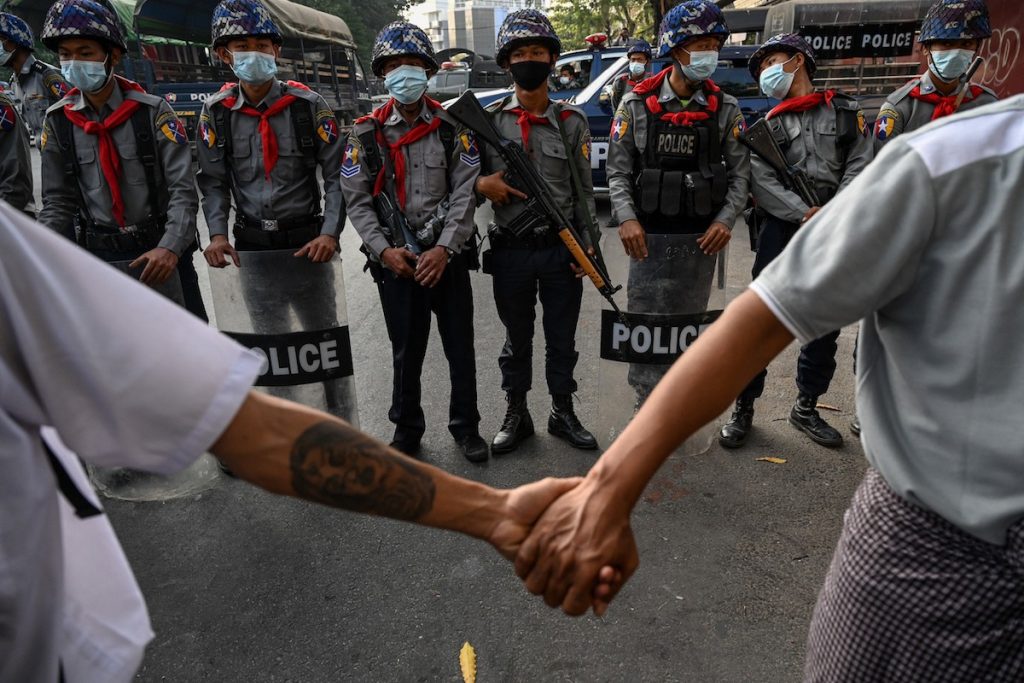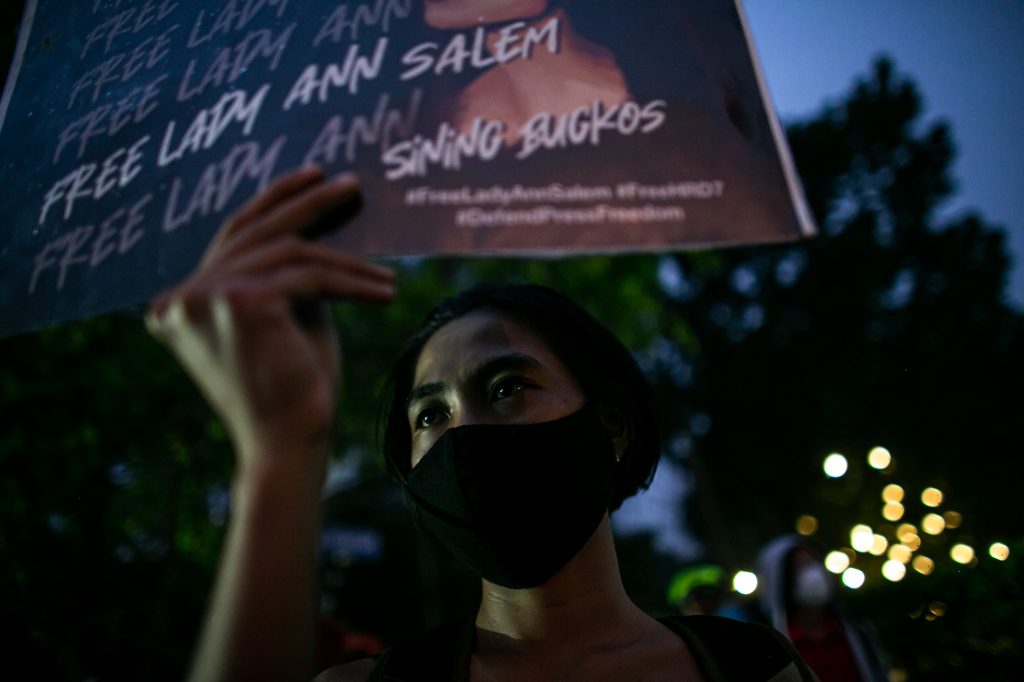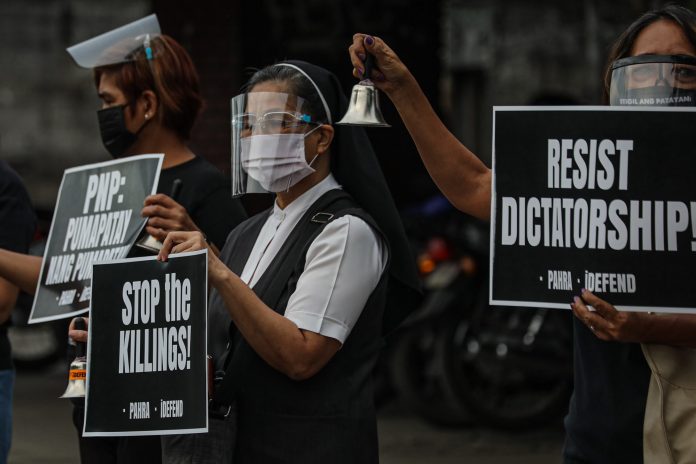Death shall not unclench me. / I am earth, wind, and sea. ~ Poet Jose “Pete” Lacaba, Prometheus Unbound
If true that poets are the “unacknowledged legislators of the world,” as Percy Bysshe Shelley wrote in his 1821 essay “In Defense of Poetry,” then the detention and murder of poets signal the world’s descent into lawlessness.
March 3, 2021, a protest march against the military junta erupted in Monywa, Saggaing Division in Myanmar. Joining the peaceful gathering were poets Myint Myint Zin and Kay Za Win, who were later killed.
Six days later, March 9, a famous poet, Maung Yu Py, was reportedly arrested, severely beaten, and charged under Article 505 in Myeik, Tannintharyi Division. His supposed lawyer, another poet, was seized and detained after announcing that he would take on Maung Yu Py’s case.
Human Rights Watch parses Section 505 as the criminalizing of speech. It imposes a penalty of up to two years in prison.
It is in the nature of despotic regimes to begin their crackdown on free speech and expression right on the very day democracy, or whatever is left of it, is overthrown.
More than 12 other writers and poets on top of those I previously mentioned fell in the grip of the junta since it began in the early days of February.
The number of writers in prison in Myanmar, to say nothing of those who had been killed, could more likely increase as the junta continues to defy international calls for it to lose its grip on Myanmar and impose a transitional return to democracy.
Salil Tripathi, chair of PEN International’s Writers in Prison Committee, said “Perish the thought that the Myanmar military is committed to democracy or the rule of law. Besides arresting elected representatives to the new parliament, it is busy detaining independent-minded writers and thinkers. This is a power grab, taking Myanmar back by decades.”

Back here at home, journalists face a similar threat. Under the administration of President Rodrigo Duterte, a little over 20 journalists have been killed in the last four years of his presidency. If the number of unsolved cases in the vigilante drug war killings alone is any indication of the level of impunity involved, there is reason for the public to be wary, suspicious and indignant.
On a more recent note, Frenchiemae Quimpo, a correspondent for the Eastern Vista, was arrested in February together with four other activists in a joint anti-communist raid of military and police in Tacloban. Quimpo remains in detention as of this writing.
Lady Ann Salem, detained on Dec. 10, 2020 under trumped-up charges (illegal possession of firearms and explosives), was freed early this month after continued calls for her release. Salem is the editor of Manila Today.
Duterte’s red-tagging and anti-communist drive, backed-up by the Anti-Terrorism Law and his continuing war on drugs, have all but strengthened the moral distinctions necessary to establish a rule of law. Legislation now stands as a weaponized tool against dissent and free speech, leaving such moral distinctions porous, its legal borders blurred.
After my discussion with Carlos Conde of Human Rights Watch on the differences between the Philippines and Myanmar in its treatment of free speech, he said, “I think a related aspect of this is that writers and journalists, in this day and age, are not being arrested a la ’70s but are muzzled in ways that are not as brutal or overt. I mean, the chilling effect social media spreads is, in my view, no worse than actually jailing a writer. The muzzling takes many forms.”

In the 1970s, the atrocities of former dictator Ferdinand Marcos included the murder of one of our esteemed poets, Emmanuel “Eman” Lacaba, shortly after the First Quarter Storm shook the nation. He was only 27.
Another poet, Jose “Pete” Lacaba, suffered detention and torture under the martial law regime. His poem, “Prometheus Unbound,” a poetic critique of Marcos as a lapdog of American imperialism, appeared initially unnoticed in a magazine which operated under the thumb of the erstwhile dictator.
As with most sociopolitical upheavals, the nightmare begins when any attempt to overthrow an abusive government is replaced by something detrimentally more heartless—or laughable—than the former. This, more than anything, constitutes the poetics of fascism.
But then it begs the question why. Why are poets the targets of tyrants? These silent, sullen ones falling as the object of state-sanctioned murder? Why are men and women of letters fall prey to political predators?
Ed Simon of Literary Hub, speaking of journalist Scott Simon’s tale about the Serbian war criminal and poet Radovan Karadžić, implied that the reason for the tyrant’s fondness for poets and poetry lie in this idea that “in the heart of every great tyrant, there is great self-pity.”
The former Soviet Union’s Josef Stalin, who was said to had been an artist, and an “admirer” of novelist Boris Pasternak’s novel, Dr. Zhivago (an admiration Pasternak himself despised), launched what was known as the Night of the Murdered Poets where 13 Jewish intellectuals were executed in 1952. Earlier, poet Osip Madelstam was arrested and later disappeared in the gulags of the Soviet Union.
What do you think? If New Yorker’s Adam Gopnik’s assessment that “Dictatorship has, in one sense, been the default setting of humanity,” then would it be safe to assume that poetry, being humanity’s soul, is in itself a power recognized by tyrants, thus the suspicion that they are enemies of the State.
As the world’s legislators, however unacknowledged, this power offers poets more than the commonplace facility for romanticism for which Shakespeare’s sonnets and Pablo Neruda’s lines have become well-known. It is, no doubt, a force to be reckoned with where truth is concerned, enough to place each and every poet in the crosshairs of tyranny.
In fact, experts today believe that even the “lovelorn” Neruda may have been killed days after dictator Augusto Pinochet’s military coup toppled the democratically elected government of Pres. Salvador Allende of Chile. He may not have died of a heart attack.
We can all go gaga while discussing the dialectics of verse versus tyranny over quarantined beer, but make no mistake: the murder of the world’s poets is less an indictment of writers then it is a denunciation of the world’s apathy.
I believe the public has neglected poets for far too long. As beneficiaries of the fire of poetry, we must all build a wall of solidarity around them, all the men and women of letters who shine their light into today’s darkness.
But more than public support, writers, poets and journalists, historians and playwrights, all artists of the spoken and written word, must band together in this time of crisis. Let’s deal with our differences some other time.
As I once wrote, quoted by poet Alfred “Krip” Yuson in the Introduction of the anthology “Bloodlust: Philippine Protest Poetry from Marcos to Duterte” (2017):
“A convergence must take place. Poets and storytellers, these masters of language and the imagination, must finally shake hands with the virtuoso of memory, the historian, and the maestro of inquiry, the journalist. The fight we face is of such magnitude that we will need the past, the present, and the future to come together as one. Make no mistake about it. They will knock on our doors. This convergence must happen and not a minute too soon.”
All throughout history, tyrants have knocked down the doors of poets. It’s time for poets around the world to knock back. And knock hard.
Joel Pablo Salud is an editor, journalist and the author of several books of fiction and political nonfiction. He is currently the chair of the Philippine Center of International PEN’s Writers in Prison Committee. The views and opinions expressed in this article are those of the author and do not necessarily reflect the official editorial position of LiCAS.news.









